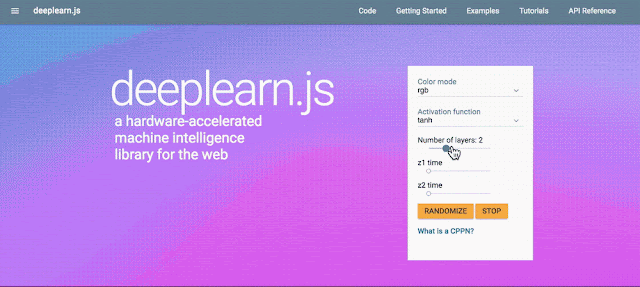Machine learning (ML) has become an increasingly powerful tool, one that can be applied to a wide variety of areas spanning object recognition, language translation, health and more. However, the development of ML systems is often restricted to those with computational resources and the technical expertise to work with commonly available ML libraries.
With PAIR — an initiative to study and redesign human interactions with ML — we want to open machine learning up to as many people as possible. In pursuit of that goal, we are excited to announce deeplearn.js 0.1.0, an open source WebGL-accelerated JavaScript library for machine learning that runs entirely in your browser, with no installations and no backend.
There are many reasons to bring machine learning into the browser. A client-side ML library can be a platform for interactive explanations, for rapid prototyping and visualization, and even for offline computation. And if nothing else, the browser is one of the world's most popular programming platforms.
While web machine learning libraries have existed for years (e.g., Andrej Karpathy's convnetjs) they have been limited by the speed of Javascript, or have been restricted to inference rather than training (e.g., TensorFire). By contrast, deeplearn.js offers a significant speedup by exploiting WebGL to perform computations on the GPU, along with the ability to do full backpropagation.
The API mimics the structure of TensorFlow and NumPy, with a delayed execution model for training (like TensorFlow), and an immediate execution model for inference (like NumPy). We have also implemented versions of some of the most commonly-used TensorFlow operations. With the release of deeplearn.js, we will be providing tools to export weights from TensorFlow checkpoints, which will allow authors to import them into web pages for deeplearn.js inference.
You can explore the potential of this library by training a convolutional neural network to recognize photos and handwritten digits — all in your browser without writing a single line of code.
We're releasing a series of demos that show deeplearn.js in action. Play with an image classifier that uses your webcam in real-time and watch the network’s internal representations of what it sees. Or generate abstract art videos at a smooth 60 frames per second. The deeplearn.js homepage contains these and other demos.
Our vision is that this library will significantly increase visibility and engagement with machine learning, giving developers access to powerful tools while simultaneously providing the everyday user with a way to interact with them. We’re looking forward to collaborating with the open source community to drive this vision forward.

